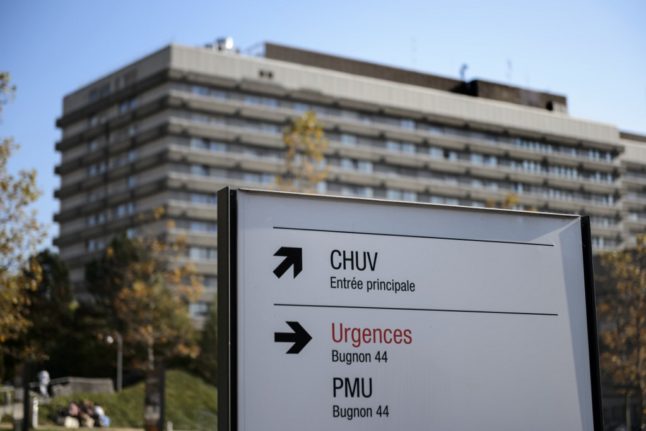Everything you need to know about hospital care in Switzerland

Chances are that sooner or later, all of us will have to use a Swiss hospital, whether for an outpatient procedure or inpatient care. What are the different types of healthcare facilities and what can you expect from each?
There are more than 280 hospitals throughout Switzerland, and the general level of care is excellent.
While they all have the same mission — to treat patients — these health facilities differ in size, structure, and the way they function.
The biggest ones are university hospitals, followed by cantonal, and then municipal / district hospitals.
University hospitals
Let’s start with university medical centres.
Switzerland has five university-affiliated cantonal medical centres: The largest is Geneva’s University Hospital (HUG). Next is Vaud’s facility in Lausanne (CHUV), Inselspital in Bern, as well as University Hospitals in Zurich and Basel.

A part of the Geneva University Hospitals (HUG) buildings. Photo by Fabrice COFFRINI / AFP
They have a dual purpose: to treat patients, of course, but also to train and provide research opportunities to medical students from universities associated with a given hospital.
Many of the chief physicians also teach at the university, and carry the title of professor in addition to doctor.
Teaching hospitals are typically larger that ‘regular’ hospitals, with different services — such as for instance orthopedics, maternity, psychiatry, or various specialised polyclinics — located in different buildings nearby.
Cantonal hospitals
All Swiss cantons have their own cantonal hospitals, which are not associated with universities, but are bigger and provide more services than smaller municipal and/or district hospitals.
They are usually located in or near each canton’s capital, sometimes in several neighbouring locations.
Municipal or district hospitals
These hospitals are usually the smallest medical facilities, serving a given town and its immediate area.
Sometimes, several neighbouring towns band together to get one hospital covering several communities. They are known as district hospitals.
All of the above medical facilities are public, financed mostly by the canton or municipalities, with other funds coming from other sources as well.
Which hospital can you be treated at?
This is determined by various factors.
According to the Federal Office of Public Health (FOPH), “a patient is basically entitled to a free choice of healthcare professional or public care facility".
If you have a life-threatening emergency, the ambulance will take you to the nearest hospital.
In the event you need to be hospitalised, you will likely go to the hospital at which your surgeon usually operates; sometimes he or she is associated with more than one hospital, in which case you can choose.
It is possible too that the kind of surgery you require is so specialised that a local hospital doesn’t have the capacity to perform it, so you will be operated on at a university hospital, which typically has more specialised doctors and equipment.

The University Hospital of Lausanne (CHUV). Photo by FABRICE COFFRINI / AFP
Does your basic health insurance (KVG in German and LaMal in French and Italian) cover treatment in all of the above hospitals?
Yes, provided that you are treated in your canton of residence, as KVG / LaMal will only pay for treatment (both outpatient and in-hospital) in the canton where the patient lives.
The reason is that each canton sets its own healthcare premiums, some of which are higher than others, so if you live in a ‘cheaper’ canton and want to be treated in a more expensive one, your provider may not like it.
However, this rule applies only to non-urgent situations; emergency cases are treated differently.
"In an emergency, you can go to any hospital in Switzerland," the FOPH said, adding that it must be an authorised public health facility, rather than a private clinic, which in principle is not covered by the basic insurance (see below)
It defines “emergency” as a situation when “your state of health does not permit you to be taken to a hospital in the canton where you live. You will be transferred to a hospital in the canton where you live as soon as this is possible and sensible".
FOPH also allows out-of-canton treatment for "particular medical reasons" — that is, if the required care can’t be provided at a public healthcare facility in your canton of residence.
READ MORE: Will my Swiss health insurance cover treatment in another canton
If you have a supplemental insurance, however, it may cover you for out-of-canton medical treatments.
What about private hospitals?
Commonly known as clinics, they are more exclusive than public hospitals, and open only to people with private or semi-private insurance (clinics do, however, accept KVG / LaMAL for outpatient procedures only).
While in a public hospital you may have to share the room with other patients (unless you have private insurance), in a clinic you will be in a private or semi-private room and have all the perks of a five-star hotel.
Unlike public hospitals, which are funded by the government, clinics are owned privately.
For instance, the Hirslanden chain of clinics belongs to the UBS bank, while another chain, Swiss Medical Network, is funded by Credit Suisse.
READ MORE: Acupuncture to rolfing: What your Swiss health insurance gets you (if you pay more)
Comments
See Also
There are more than 280 hospitals throughout Switzerland, and the general level of care is excellent.
While they all have the same mission — to treat patients — these health facilities differ in size, structure, and the way they function.
The biggest ones are university hospitals, followed by cantonal, and then municipal / district hospitals.
University hospitals
Let’s start with university medical centres.
Switzerland has five university-affiliated cantonal medical centres: The largest is Geneva’s University Hospital (HUG). Next is Vaud’s facility in Lausanne (CHUV), Inselspital in Bern, as well as University Hospitals in Zurich and Basel.

They have a dual purpose: to treat patients, of course, but also to train and provide research opportunities to medical students from universities associated with a given hospital.
Many of the chief physicians also teach at the university, and carry the title of professor in addition to doctor.
Teaching hospitals are typically larger that ‘regular’ hospitals, with different services — such as for instance orthopedics, maternity, psychiatry, or various specialised polyclinics — located in different buildings nearby.
Cantonal hospitals
All Swiss cantons have their own cantonal hospitals, which are not associated with universities, but are bigger and provide more services than smaller municipal and/or district hospitals.
They are usually located in or near each canton’s capital, sometimes in several neighbouring locations.
Municipal or district hospitals
These hospitals are usually the smallest medical facilities, serving a given town and its immediate area.
Sometimes, several neighbouring towns band together to get one hospital covering several communities. They are known as district hospitals.
All of the above medical facilities are public, financed mostly by the canton or municipalities, with other funds coming from other sources as well.
Which hospital can you be treated at?
This is determined by various factors.
According to the Federal Office of Public Health (FOPH), “a patient is basically entitled to a free choice of healthcare professional or public care facility".
If you have a life-threatening emergency, the ambulance will take you to the nearest hospital.
In the event you need to be hospitalised, you will likely go to the hospital at which your surgeon usually operates; sometimes he or she is associated with more than one hospital, in which case you can choose.
It is possible too that the kind of surgery you require is so specialised that a local hospital doesn’t have the capacity to perform it, so you will be operated on at a university hospital, which typically has more specialised doctors and equipment.

Does your basic health insurance (KVG in German and LaMal in French and Italian) cover treatment in all of the above hospitals?
Yes, provided that you are treated in your canton of residence, as KVG / LaMal will only pay for treatment (both outpatient and in-hospital) in the canton where the patient lives.
The reason is that each canton sets its own healthcare premiums, some of which are higher than others, so if you live in a ‘cheaper’ canton and want to be treated in a more expensive one, your provider may not like it.
However, this rule applies only to non-urgent situations; emergency cases are treated differently.
"In an emergency, you can go to any hospital in Switzerland," the FOPH said, adding that it must be an authorised public health facility, rather than a private clinic, which in principle is not covered by the basic insurance (see below)
It defines “emergency” as a situation when “your state of health does not permit you to be taken to a hospital in the canton where you live. You will be transferred to a hospital in the canton where you live as soon as this is possible and sensible".
FOPH also allows out-of-canton treatment for "particular medical reasons" — that is, if the required care can’t be provided at a public healthcare facility in your canton of residence.
READ MORE: Will my Swiss health insurance cover treatment in another canton
If you have a supplemental insurance, however, it may cover you for out-of-canton medical treatments.
What about private hospitals?
Commonly known as clinics, they are more exclusive than public hospitals, and open only to people with private or semi-private insurance (clinics do, however, accept KVG / LaMAL for outpatient procedures only).
While in a public hospital you may have to share the room with other patients (unless you have private insurance), in a clinic you will be in a private or semi-private room and have all the perks of a five-star hotel.
Unlike public hospitals, which are funded by the government, clinics are owned privately.
For instance, the Hirslanden chain of clinics belongs to the UBS bank, while another chain, Swiss Medical Network, is funded by Credit Suisse.
READ MORE: Acupuncture to rolfing: What your Swiss health insurance gets you (if you pay more)
Join the conversation in our comments section below. Share your own views and experience and if you have a question or suggestion for our journalists then email us at [email protected].
Please keep comments civil, constructive and on topic – and make sure to read our terms of use before getting involved.
Please log in here to leave a comment.